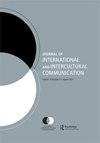当我们说“拉丁”是什么意思?:定义的力量,包容性的限制,以及身份类别的(un/re)构成
IF 2.2
Q2 COMMUNICATION
Journal of International and Intercultural Communication
Pub Date : 2021-04-05
DOI:10.1080/17513057.2021.1901957
引用次数: 1
摘要
本文考察了“拉丁语”作为包容性和多样性的话语标记在空间中的轨迹,这些空间重视承认包容性,对多样性敏感,并参与社会正义。我认为,虽然这个词在过去五年中被广泛采用反映了一种值得称赞的向性别包容性语言的转变,但它也表明了一种狭隘的包容性视野,忽视了边缘化社区对社区特定语言的需求和发展。这是拉丁美洲后裔的跨性别、非二元和性别不一致的个人要求的自我命名权的一种变通。最后,我认为,“拉丁语”的发展表明了学术界和活动家对该术语的重新表述,他们的定义实践侧重于拉丁语对机构和组织的有用性,而不是边缘化的个人和社区成员。本文章由计算机程序翻译,如有差异,请以英文原文为准。
What do we mean when we say “Latinx?”: Definitional power, the limits of inclusivity, and the (un/re)constitution of an identity category
ABSTRACT This article examines the trajectory of “Latinx” as a discursive marker of inclusivity and diversity within spaces that value recognition as inclusive, sensitive to diversity, and engaged with social justice. I argue that while the term’s wide adoption during the last five years reflects a laudable shift toward gender-inclusive language, it also demonstrates a narrow vision of inclusivity that disregards marginalized communities’ need for and development of community-specific language. This is a co-optation of the right to self-naming demanded by trans, non-binary, and gender non-conforming individuals of Latin American descent. Ultimately, I suggest that the development of “Latinx” demonstrates a reformulation of the term by academic and activist actors whose definitional practices focus on the usefulness of Latinx for institutions and organizations rather than marginalized individuals and community members.
求助全文
通过发布文献求助,成功后即可免费获取论文全文。
去求助
来源期刊

Journal of International and Intercultural Communication
COMMUNICATION-
CiteScore
3.80
自引率
12.50%
发文量
19
 求助内容:
求助内容: 应助结果提醒方式:
应助结果提醒方式:


